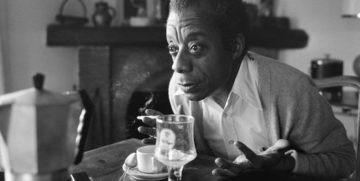
Bill V. Mullen in Literary Hub:
In 1985, Baldwin’s published and some unpublished essays were gathered in a single volume titled The Price of the Ticket. The book was significant for both looking backward, retrospectively and in a monumental manner, at the whole of Baldwin’s life, and forward, to the beginnings of the process of his memory and commemoration. By 1985, Baldwin’s literary production had become relatively meager. He was tired, winding down, traveling less, and camping out mainly at St. Paul-de-Vence. The lover he had lost to AIDS, according to David Leeming, died with him there, his ashes scattered around the property’s garden.
Baldwin was committed to two writing projects in these closing years of his life. The first, begun years earlier, was titled No Papers for Muhammad. According to Baldwin biographers James Campbell and David Leeming, the novel was to be based on Baldwin’s own frightening encounter with French immigration authorities—one perhaps fictionalized in David’s near apprehension by the police in “Les Evade’s”—and on the case of an Arab friend deported to Algeria.
Baldwin never completed the novel. However, important kernels and seedlings from it did manifest themselves in what became his final creative project, a play entitled The Welcome Table. Magdalena Zaborowska, in her superb book on Baldwin’s Turkish decade, refers to Baldwin’s The Welcome Table as a “last testament” to major life themes, including exile, erotics, and the multiple identities of the diasporic black subject. It is also, as Joseph Vogel noted, the only place in his creative writing where Baldwin made reference to the AIDS/HIV crisis.
More here.
